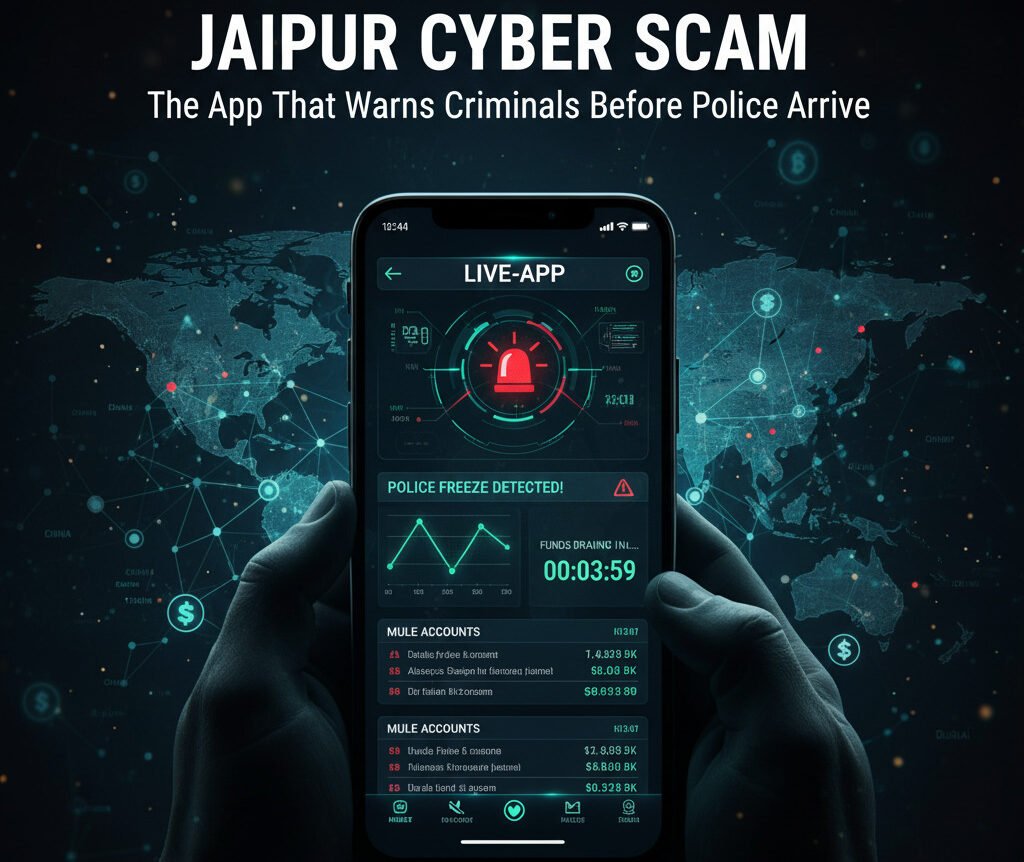Jaipur — Police in Rajasthan have uncovered a startling new weapon in the arsenal of cybercriminals: a Chinese-made monitoring app that alerts fraudsters the moment their bank accounts come under investigation.
In a state that has reported ₹3.38 billion lost to cyber fraud in just nine months, investigators say this single tool has helped scammers outpace India’s cyber law enforcement.
During the interrogation of Ankit Sharma, the alleged mastermind of a ₹122-crore scam arrested by Bhiwadi Police, authorities learned that gangs linked to China and Dubai are using a “LIVE-APP” system to monitor mule accounts in real time.
“The app instantly shows when money is credited, withdrawn, or when police initiate a freeze,” said Superintendent of Police Prashant Kiran, who is leading the investigation. “That gives the fraudsters a few minutes to drain the account before we can act.”
The revelation has exposed how global cybercrime rings have turned India’s own financial systems into tools for rapid laundering — powered by real-time foreign technology.
The App That Warns Criminals Before Police Arrive
At the center of the investigation is the LIVE-APP, a cloud-based system that connects multiple mule accounts — often belonging to Indian citizens who “rent out” their bank accounts for a small commission — to a single monitoring dashboard.
Whenever cyber police file a freeze request through the national 1930 helpline, the app immediately flashes a warning. Fraudsters then transfer the funds to secondary accounts, buy cryptocurrency, or convert them into dollars within minutes.
The First Firm to Assess Your DFIR Capability Maturity and Provide DFIR as a Service (DFIRaaS)
Even routine notifications from banks — alerting account holders to freezes or suspicious activity — are rerouted to the scammers, since the email IDs and mobile numbers linked to those accounts are controlled by them.
“The fraudsters don’t just watch the accounts,” said a senior officer familiar with the probe. “They also track how much commission each Indian mule earns. It’s an entire ecosystem of accountability — for criminals.”
Ankit Sharma and the International Network
Police say Ankit Sharma, a 30-year-old resident of Baghpat, Uttar Pradesh, acted as a crucial middleman between Chinese cyber syndicates and Indian agents. A graduate who once held minor private jobs, Sharma shifted to cybercrime six years ago, building a network that sourced fake and genuine bank accounts, ATMs, and cheque books for sale to foreign handlers.
His interrogation has revealed direct operational links between China, Dubai, and Southeast Asian networks, where the masterminds oversee operations through encrypted Telegram and WhatsApp groups.
The Indian agents — recruited on commission — never interact directly with their overseas handlers. Each transaction earns them up to 3% of the total funds, often laundered through cryptocurrency exchanges such as Coin App, Shope App, and Aptop App.
During the raids, police seized 38 cheque books, 20 ATM cards, 9 mobile phones, 8 QR codes, and ₹2.5 lakh in cash. Investigators have tied the network to 183 cyber complaints across multiple states, with frauds totaling ₹122 crore.
Cybercrime’s Expanding Footprint in India
Between January and September 2025, Rajasthan recorded over 1,02,000 cybercrime complaints, a 31.5% increase from last year. In August alone, 12,612 complaints — or about 406 per day — were logged through the 1930 helpline. Yet, police have managed to recover only ₹2.22 crore so far.
Authorities say part of the challenge lies in the evolving sophistication of cross-border cyber gangs. By using crypto-based conversions and real-time fund tracking, these groups erase their money trails faster than police can document them.
Despite recent crackdowns — including the blocking of 95,000 SIM cards linked to fraud networks — law enforcement officials admit that the technological gap is widening.
“These gangs operate like startups — agile, anonymous, and globally networked,” said one cyber investigator. “We’re still playing catch-up.”
Rajasthan Police, in coordination with the Indian Cyber Crime Coordination Centre (I4C), is now analyzing the backend infrastructure of the LIVE-APP to determine whether it was hosted on Chinese cloud servers. Early leads suggest an encrypted relay system that bypassed domestic tracking tools.
A Global Challenge with Local Victims
For Indian authorities, the case illustrates a troubling new phase of digital crime — one where cybercriminals no longer just exploit human error, but weaponize technology faster than regulators can respond.
“Every time we learn a new scam technique, they’ve already built a new tool,” a senior official in Delhi’s cyber division said. “The fight against fraud is now a real-time battle.”
As India’s digital economy expands, police warn that the gap between policy and policing may determine whether the next ₹300 crore stolen vanishes — or is ever recovered.


